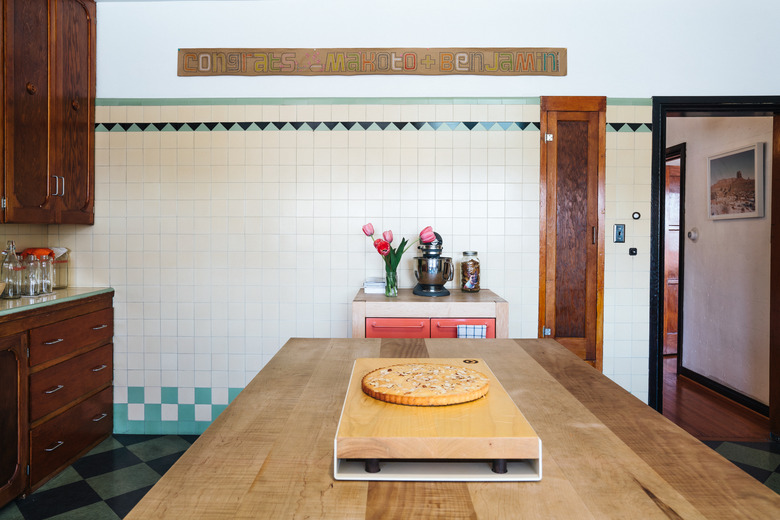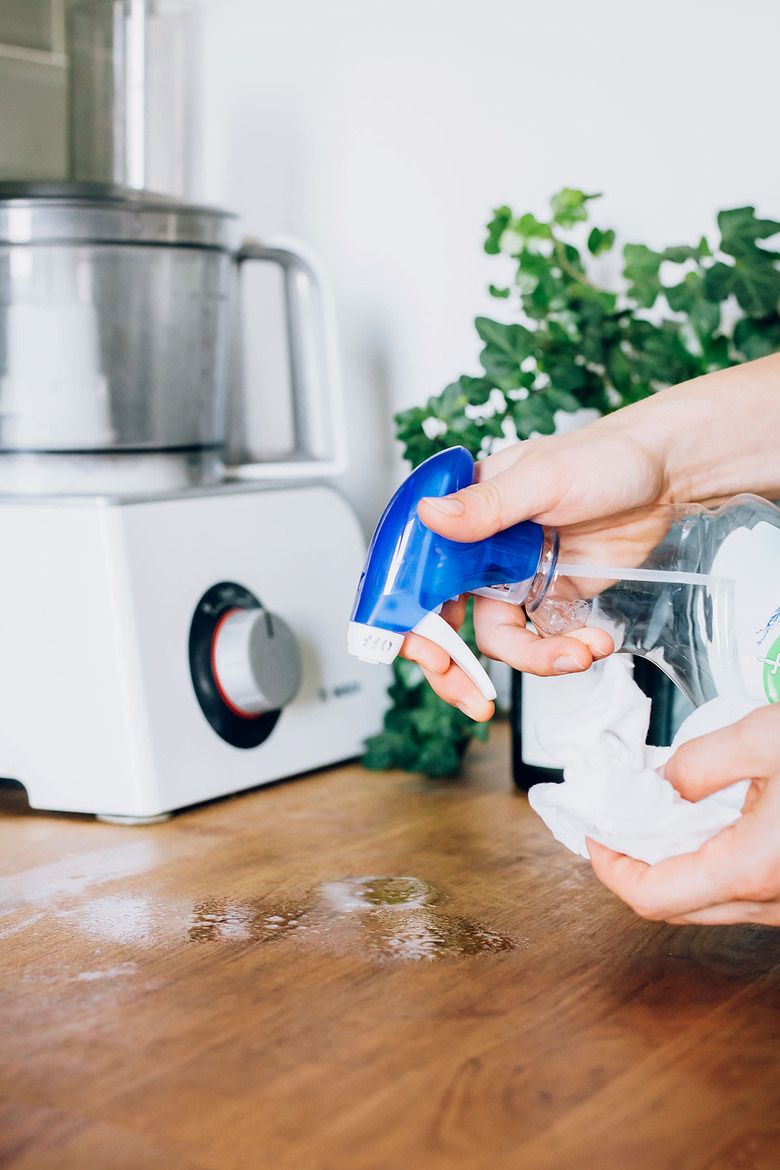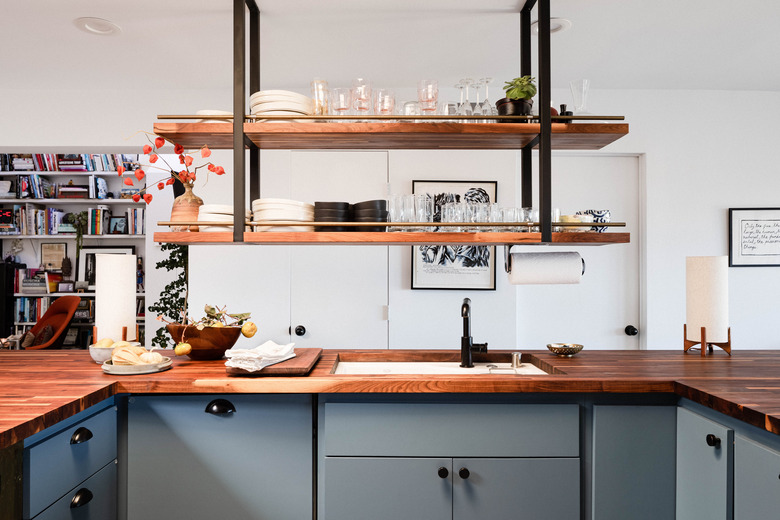How To Clean Wood Countertops
Whether they're in the kitchen, bathroom or living room, wood countertops need TLC if you want them to look their best, but the ones in the kitchen — where you do your food prep — need it most. If you're going to spill wine, drop a glob of mustard or leave a hot cup of water standing, you're more likely to do it in the kitchen than anywhere else, and because kitchen countertops have to be food-safe, they often don't have a finish that can withstand much abuse.
Film finishes like polyurethane are the easiest to clean because they are impervious to liquids, but even they can be damaged by heat, and they can't always be patched easily. When it comes to penetrating finishes, you have to clean up spills quickly because they allow liquids and oils to soak in and create permanent stains that can only be removed by sanding. Daily cleaning is recommended for kitchen countertops, but the ones in the other rooms in your house probably need cleaning only weekly or monthly.
How to Clean Your Wood Countertops
1. Wipe Down Countertops When They Need It
All countertops, no matter what finish they have, need to be cleaned on an as-needed basis, and cleaning pros such as Maids by Trade offer some cleaning tips. Start by using a dry cloth or a paper towel to wipe off the big stuff, including crumbs, dust bunnies and dirt particles, and use a scraper such as a spatula to remove gunk from crevices. Mix a three-to-one solution of water and vinegar in a spray bottle, spray it on the surface and wipe it off immediately with a damp cloth.
White vinegar is a good disinfectant, but it can turn finishes such as polyurethane and lacquer dull, so it's important not to leave it standing on any countertops with a glossy finish. It's an especially good treatment for butcher-block countertops because it penetrates more easily than bleach, and it's safer for the wood. Some cleaners prefer to use apple-cider vinegar, which isn't quite as acidic.
If you don't have any vinegar, you can substitute a solution of lemon juice or dish soap and water. Countertop manufacturer J. Aaron recommends deep cleaning butcher-block countertops by spreading salt and scrubbing it in with the exposed face of a lemon you've cut in half.
2. Identify the Finish Prior to Deep Cleaning
It's important to know the type of finish with which you're dealing before trying to remove stains because you may need to use solvents that can harm some finishes while having no effect on others. You may also have to do some sanding, and if so, you'll want to know which finish you should use to repair the part you sanded.
- Rub your fingers lightly across the wood. If it feels slightly rough and furry, it has a penetrating oil finish, but if it feels smooth (more like plastic than wood), it has a film finish.
- Distinguish a hardening-oil penetrating sealer such as tung oil from a food-safe, nonhardening oil such as mineral oil by putting a drop of olive oil on the wood. The drop will bead up if the finish is a hardening oil.
- Determine whether a film finish is polyurethane by dropping a few drops of nail polish remover on an inconspicuous part of the countertop. Wait a minute and then feel the finish. If it's hard, the finish is polyurethane, but if it feels tacky, it's lacquer or shellac. If the finish is tacky, repeat the test with isopropyl alcohol, which will soften shellac but not lacquer.
3. Remove Water Marks From Film Finishes
Water marks occur when you leave a warm glass or pot of water on wood countertops. If the wood has a film finish and the marks are white, you can remove them with olive oil or mayonnaise. Spread the condiment on the stains, cover it and leave it overnight. Wipe off the excess oil or mayonnaise in the morning and then give the area a general cleaning with a water-vinegar solution.
An alternative method for removing water marks from wood countertops with a film finish is to use heat. Place a dish towel over the stain and set a dry clothes iron set to medium heat on top. The heat should cause the water trapped inside the finish that is causing the stain to evaporate.
4. Remove Surface Stains
You can usually remove oil, wine, fruit juice and condiment stains from wood countertops by using baking soda and scrubbing with a soft cloth. Baking soda is mildly abrasive, but it won't scratch film finishes, and as a bonus, it disinfects and deodorizes.
If you need a solvent to dissolve stubborn stains, use acetone on surfaces finished with polyurethane, penetrating oil or shellac; use isopropyl alcohol on lacquered surfaces. Use the solvent sparingly and dab the stain rather than rubbing it vigorously. Remove as much of the stain as you can with this method and then rub with baking soda or salt if necessary.
5. Remove Deeply Embedded Marks and Stains
Water marks and other stains that have penetrated a film finish or affected wood finished with a penetrating sealer are more difficult to remove. You may be able to scrub them out using Bar Keepers Friend or a similar cleaner, but if that doesn't work, you'll probably have to resort to sandpaper.
Use a medium-grit sandpaper such as 100 or 120 to remove the actual stains. Sand by hand going with the grain until the stain is gone and then use a fine-grit paper such as 150 or 220 to smooth out the repair and erase sanding marks. When you're done, apply an appropriate touch-up finish to complete the repair.
6. Maintain Butcher-Block Countertops With Regular Oiling
Butcher-block countertops require a regular application of food-safe oil to keep them from drying out and to maintain their appearance. Before you apply oil or, even better, butcher-block oil, which is a combination of mineral oil and beeswax or paraffin wax, wipe down the wood surface with a cloth dampened with warm water. If lingering food residue is causing odors, wipe with a three-to-one solution of water and vinegar to disinfect.
Let the wood dry out and then wipe the oil with a soft cloth. One application is usually all it takes to restore the natural wood color. If you repeat this procedure once a month, your butcher-block countertops will last indefinitely.
Butcher-block countertops rarely have a surface finish, but when they do, it's usually a highly durable, low-maintenance polyurethane or resin coating that resists damage from cutting blades. A periodic wipe-down with a vinegar or dish-soap solution or with lemon juice is all it needs to stay clean.


